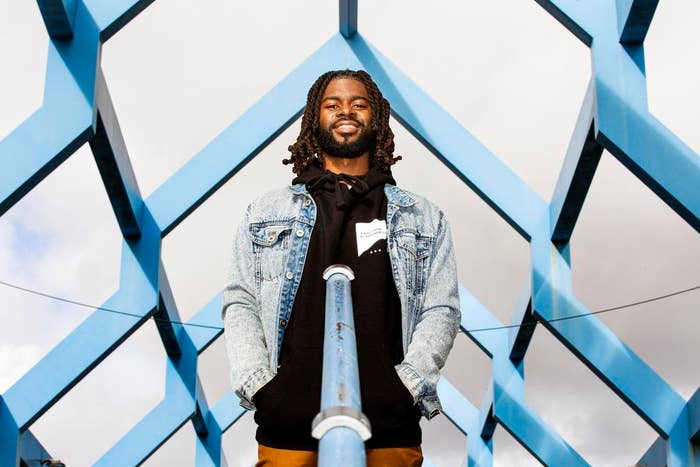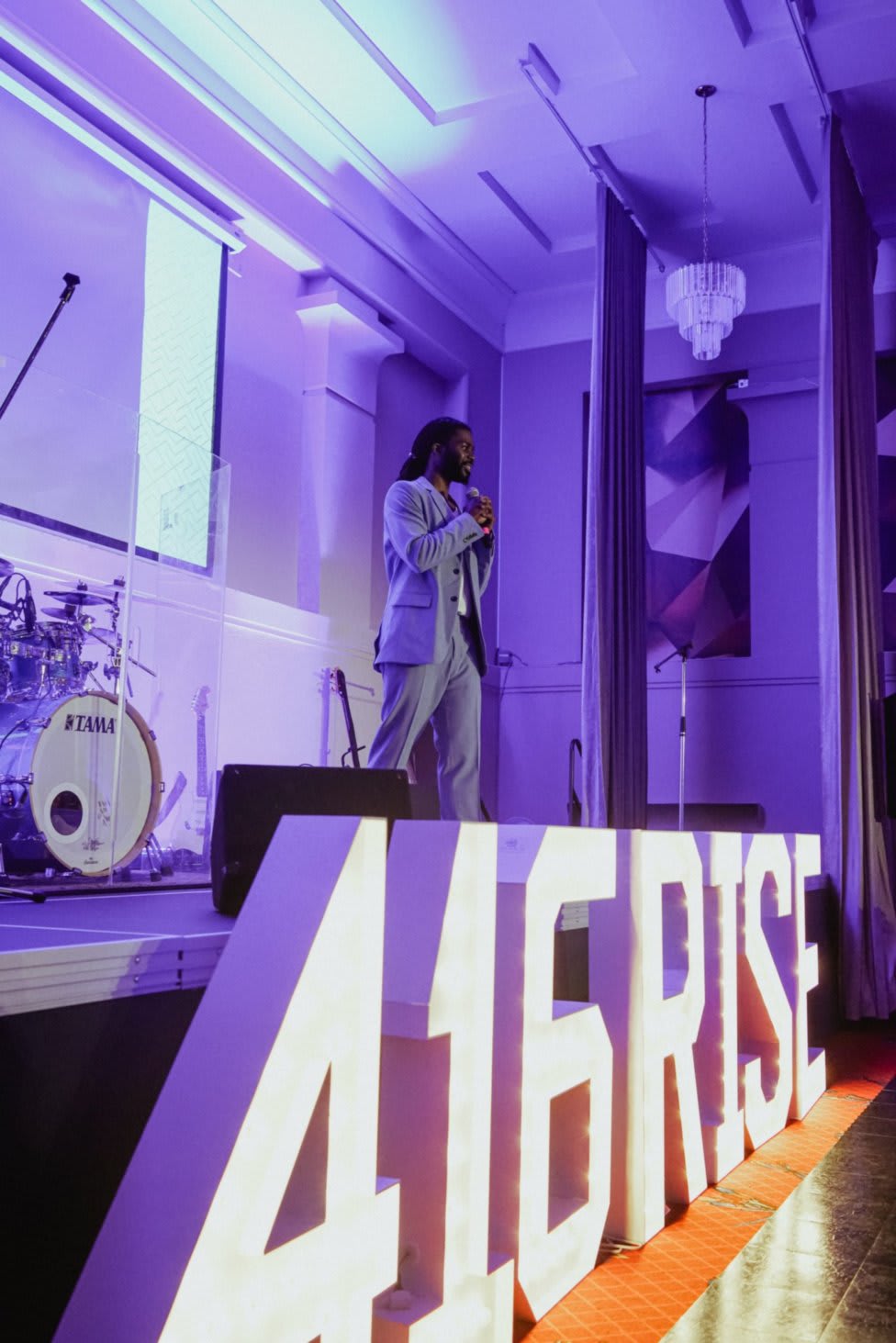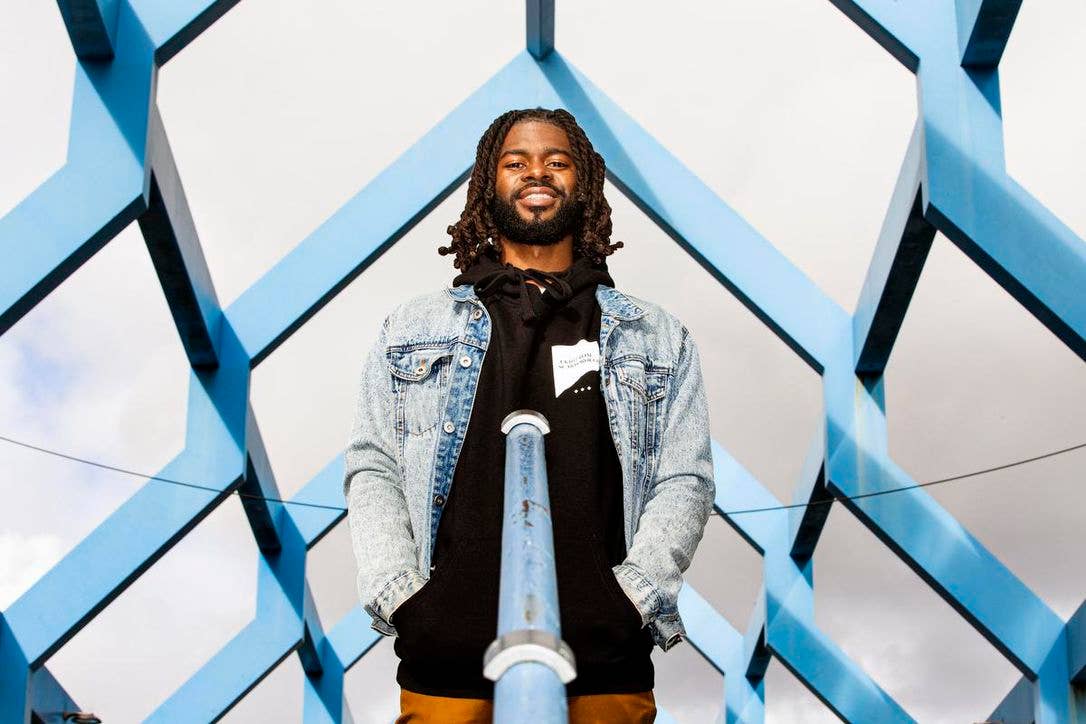
Randell Adjei believes that self-expression can change people.
And as Ontario’s first Poet Laureate and founder of R.I.S.E. (Reaching Intelligent Souls Everywhere), he’s witnessed the power of self-expression first-hand. R.I.S.E. is one of the most respected and longest-running youth-focused initiatives in Toronto. Their programs and events are designed to uplift, empower, and nurture underserved and aspiring creatives, which has led them to success for over 10 years.
In Toronto, the organization’s impact can’t be emphasized enough. They offer a diverse range of workshops, showcases, panels, and summits for young BIPOC artists in different communities. Ultimately, providing up-and-coming performers with the skill sets and opportunities needed to express themselves in a positive way.
To help stimulate arts and culture, the Lights, Camera, Action (LCA) program run by Adjei and R.I.S.E. is being sponsored by TD, through the TD Ready Commitment, the Bank’s corporate citizenship platform. It’s a performance-based incubator that hopes to bridge the gap between emerging artists and professionals in today’s digital world.
In an effort to inspire this generation and the next, Lights, Camera, Action aims to raise the visibility of 32 BIPOC artists throughout 2023—focusing on “helping them adapt to the new digital realities of musical performance and production.”
To learn more, Complex Canada recently caught up with Adjei to discuss the LCA initiative, R.I.S.E., how to empower the youth, and the importance of approaching social change with a community-first mindset. This interview has been condensed and edited for clarity.
For those unfamiliar, explain who you are and the mission statement behind R.I.S.E.
I am an alchemist. I am someone who believes in the power of art and the ability of art to transform, to heal, and to help us express ourselves. I’m a poet. I’m an author. And I’m somebody who believes in when you have a gift, it’s not ours, it’s ours to give. R.I.S.E. is pretty much a culmination of that. It’s a movement that propels itself on how we use art to make this world a better place. So through workshops and panels and mentorship, and through our weekly events, we want to support the next generation of artists to recognize that it’s okay to be vulnerable.
What does becoming Ontario’s first Poet Laureate mean to you?
At 12 years old, I was arrested three times for robbery and failure to comply on assault. I was never a bad kid. I was around the wrong people. I was broken. I was hurt. And what it means to me is to let other young people know no matter where you are, no matter what you’ve been through, at the end of the day, we all can transform. I hope that being in this position can show another young person that it’s possible. That I can specifically show young Black people that it’s possible to follow your vision, to follow your path, and really come into your purpose.
What is R.I.S.E.’s Lights, Camera, Action program?Lights, Camera, Action is probably one of my favourite programs we’ve come up with. During COVID, a lot of stage performers didn’t know how to pivot when it came to performing in front of a screen. But with Lights, Camera, Action, we were able to show them the business, the branding, the entrepreneurial side of things and help them work on their performance, work on being in front of a camera, work on understanding what it means to build yourself and build your capacity and then network.
We’ve really built a community, and it’s really changed lives in this city. When you create a sacred, safe, and inclusive space and try to think of as many different people in that space as possible, when you listen to them and understand their needs and problems, we can come with solutions that are able to support them.
What kind of workshops will LCA be offering to artists?
One of my favourite ones is the branding workshop because it takes them through understanding who they are. And then another workshop that we’ve done is performance coaching—being cognizant of what performance looks like onstage. Some of the other programs that we have are more like approaching art from a place of understanding business. And then one of the other workshops that we have as well is walking them through their aesthetic and how you show up, and how people see you as an artist and as a professional.
What do you hope the youth learn from LCA and other R.I.S.E. events?
From the LCA program, I hope they have an opportunity to build their own cohort and community that they can lean on or learn from, or work with and collaborate with. And for R.I.S.E., what I do hope they remember is that you can take a rocky situation and turn it into gold. Every problem is actually a learning opportunity. It’s an opportunity to learn from your mistakes, and don’t let anybody tell you who you are or who you should be.
How do you create a positive and inclusive space for youth and emerging artists to express themselves?
It’s always been a partnership. It’s always been through collaboration. It’s always been through listening. By doing things with people and never for them. Never assuming we know what they need or assuming we understand where they’re at in a certain space and time.

How do you believe R.I.S.E. can be used as a tool for social change?
I see it as a vehicle because it lets people know that they’re not alone. We’ve given civic engagement opportunities where they can work with organizations to solve some of the issues. R.I.S.E. has been a driving force and a vehicle to get you closer to having your voice heard, whether it’s artistically, politically, civically, or socially.
What was the thought process behind shaping R.I.S.E. into what it is today?
The thought process was rooted in the need. The beautiful thing about the team when we first started was that we were all artists. We knew, in a sense, how to serve, what the needs were, and what the community was looking for. From there, we focused on who we were serving and what the issues were.
How has R.I.S.E. impacted the youth that have participated in it?
We’ve really built a community, and it’s really changed lives in this city. When you create a sacred, safe, and inclusive space and try to think of as many different people in that space as possible, when you listen to them and understand their needs and problems, we can come with solutions that are able to support them.
In your opinion, what does it mean to be a community leader?
In my opinion, it’s to put yourself second. If I can be that beacon of light and show the next Randell, “Hey, you can do it too,” I think that’s what a community leader looks like. It’s someone who’s an example. Someone who is trustworthy, someone who is dedicated, committed, and ultimately someone who is willing to put themselves second because the community is first.

What advice do you have for other artists looking to start a similar program in their community?
You definitely want to surround yourself with the right people. The best thing you can do is actually build a team around the things that you may not necessarily have that they can come and fill a role in. The second thing I’d say to them is always tell people your expectations. If you communicate your expectations to the folks you’re working with, and the folks that you’re serving, what can happen is they’re more aware of how to support the movement. The third thing I say is consistency. We got here because every Monday we were there. Even when only five people showed up one week—we were there. Consistency matters. And then the final thing I would share is you have to know your why. You have to know why you’re doing it. And the why has to be bigger than you, but also build something that’s timeless—build something that’s going to live beyond yourself.
How do you plan to continue to grow and expand R.I.S.E. in the future?
In working with predominantly Black artists and a lot of people of colour, what my hope for them is to connect them to the industries where they have not been in. So the vision for me is, how do I connect commerce—or corporate—and community? Because they feed into each other. And then tech is also another thing that’s important for me. The final thing is we have this vision of a daycare. It’s really about helping those ages between one and six years old, and the idea is, how do we get those children ahead of the curve? There’s so much more, but that’s the vision we have for a legacy project for R.I.S.E.
To learn more about R.I.S.E. or get involved, visit their official site. To learn more about TD efforts to help support Black Communities click here.

